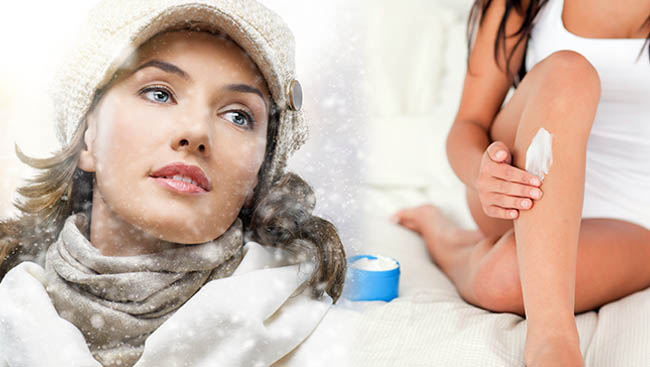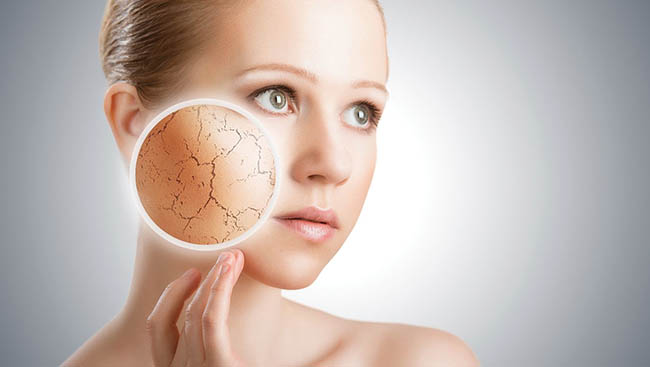Winter is back and so is the bad skin. Your skin feels dry and your lips are chapped – making you panic every time you stand before the mirror. Don’t fret! Here’s some expert skin care advice you should take into consideration before rushing to buy those winter care products.
“During winter, the skin is exposed to low humidity in the home, and to cold and wind outdoors. This may result in a reduction in skin moisture content because the normal skin barrier function has been disrupted.
When the barrier function is damaged, the skin’s protective layer is reduced and water loss occurs through evaporation. The result is skin that feels rough, appears dull in colour, and is more sensitive to certain topical products,” explains Dr. Jason Rivers, dermatologist and founder of Riversol Skin Care Inc.
Prevention is key to avoiding skin dryness, points out Dr. Rivers. “That means trying to avoid wind and cold weather from directly reaching the skin by means of clothing (e.g. wearing a scarf to protect the face).”
Use right body care products
Though the cold weather cannot entirely be avoided, the use of right body care products can help the skin. “Lotions are generally more preferable for the body,” suggests Dr. Rivers, “Avoid soaps as these products will strip the skin of its natural oils and may cause eczema or skin irritation. Look for products that contain ceramides or other lipid-containing preparations.”
He also advises using a gentle moisturizer more than once a day to lubricate and restore the skin’s barrier function. “People should consider applying a moisturizer after each shower/bath to reduce moisture loss. Don't forget the lip balm too”
Washing excessively and taking long hot showers is a complete no. The use of exfoliants and chemical peels cause further dryness, says Dr. Rivers. As for skin cleansing, it should be done with a mild cleanser applied to the skin without excess pressure or rubbing. “Trying to clean the skin too rigorously may result in the formation of acne-like lesions.”
“People should avoid products that may be occlusive to the skin or applied too thickly as these factors may clog pores and predispose people to acne,” adds Dr. Rivers about cosmetics. If the skin can tolerate products in general, he recommends using compounds that contain gentle exfoliants (AHA, BHA), antioxidants (vitamins C and E), and topical vitamin A-derived ingredients (retinol, tretinoin).
For sensitive skin, Dr. Rivers recommends Riversol Skincare as the products contain ingredients that are generally well-tolerated by the skin.
Sunscreen is a must
The use of sunscreen is a must. Ultraviolet radiation increases with altitude, and therefore you can still get burnt in the winter if you are skiing on a sunny day. “Also, although UVB is minimal during the winter months, UVA radiation from the sun (causes wrinkles, aging of the skin, and contributes to skin cancer) remains stable throughout the year. Therefore, it is reasonable to recommend that people wear a sunscreen on the face year round,” informs Dr. Rivers, adding that a sunscreen should be at least SPF 30 and should be applied at least 15 minutes before going outdoors.
Further, the sunscreen should be labelled “broad spectrum” so that you know it is protecting from both UVB and UVA. “Using a moisturizer with a sunscreen or a sunscreen alone will be very helpful to keeping the skin looking young, and to help avoid the development of brown marks on the face,” advices Dr. Rivers.
Healthy habits is the keyHealthy habits and nutritious diet are also important factors contributing to good skin. “Smoking damages the elastic and collagen fibers of the skin – not only on the face but elsewhere on the body too,” stresses Dr. Rivers.
A balanced diet can provide healthy skin. According to Dr. Rivers, a severe lack of different vitamins may result in a number of skin conditions. “Acne may be worsened by certain foods (dairy products, foods with a high glycemic index), and other conditions like rosacea can be aggravated by certain foods and alcohol.”He adds, “There is some evidence that omega-3 fatty acids (from fish oil), antioxidants (green tea, resveratrol), vitamins (vitamins A, B6, C, D3 for example) and minerals (zinc, selenium) will help to maintain the skin in an optimal condition.”
For a dose of vitamin D in the cold, dark months, the use of a supplement is advisable. “It would be reasonable to start with a daily intake of 1,000 IU a day,” says Dr. Rivers. In conclusion, he says, “Basic skin care is similar for everyone – sun protection, a gentle cleanser, and moisturizer.”






